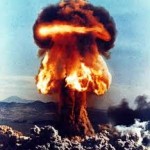We, the people of South Asia, representing civil societies from Bangladesh, Bhutan, India, Nepal, Pakistan and Sri Lanka, converged at Kathmandu on 26-27 March 2014 for a South Asia Campaign on Demilitarisation, Democratisation and Social Justice in South Asia. The participants unanimously endorsed the theme of the campaign Denouncing Militarisation and Promoting Peace in South Asia and commit to work as peace campaigners in our social movements for the cause of peace and prosperity in South Asia.
Military expenditures are expanding in South Asia region in direct contrast to aspirations of the people towards improving their living conditions and promoting peaceful coexistence by way of exercising democracy. Poor and hungry people are compelled to pay for arms and ammunitions that are often used against them in the name of maintaining law and order, on the one hand, and to fellow citizens of neighbouring countries in the name of defending national sovereignty and territorial security, on the other. Deliberate attempts to augment military expenses have intensified along with the deepening of economic and social crisis threatening the pre-existing rules of the games and pre-dominant class and social relations. Such unnecessarily increased expenses have been met largely by withdrawing or diverting the resources from social and economic services. We demand all the South Asia countries should cut their defence budget by 10 percent annually and spend the amount on welfare and social protection of the people. This cut be brought to 50 percent by the year 2020.
In South Asia, mutual suspicion and distrust continues as many inter and intrastate disputes are yet to be resolved, which often threaten peace and impede the prospects of regional cooperation. There are perennial disputes that continue to fuel hostility which, in turn, give birth to ancillary conflicts leading to escalation in military expenses. Concerted efforts be made to resolve all mutual disputes by initiating a permanent dialogue mechanism at the platform of SAARC.
South Asian countries also suffer from the problems of internal discord and disharmony, dissident and separatist movements, civil strife, ethnic and religious conflicts. Pakistan and Afghanistan are facing terrorism from Al-Qaeda and Taliban and many innocent citizens have lost lives due to bomb blasts, suicidal attacks in both the countries. Many of such problems have emanated as a result of the failure of governments to institutionalise democracy and deliver economic and social benefits to the people so as to eradicate poverty and underdevelopment. We demand a portable social security for all the citizens of South Asia.
Nuclearisation of South Asia poses major challenges today. This nuclearisation mentality exhibits blatant disregard for human rights and environment as it also grievously undermines the current global regime of nuclear non-proliferation, thereby gravely weakening the prospects of global nuclear disarmament. It also aggravates tension and acceleration of the arms race in the region. A nuclear free zone should be declared in South Asia. We are deeply concerned about the mind-set of unfair race of making nuclear weapons between India and Pakistan’s rulers.
We are also worried about Sri Lanka’s intensively militarised mind-set of the rulers by undermining democracy and democratic norms by suppressing the civil society’s voice against undemocratic steps of the government especially against minorities and vulnerable sections of the Society. Similarly, we are also concerned about Bhutani people living in Nepal as refugees and being stateless due to deprivation of their right to repatriation and we demand the non-resident Bhutanese rights be protected according to international laws.
We believe in equality and democracy and we struggle for equal rights for minorities and vulnerable sections like women and children. We resolve to struggle for democratisation in all states. Trade unions and students unions should be allowed to freely work in all South Asian countries. Trade union rights should be extended to all sectors including for agriculture workers.
We share common geography and the region is blessed of natural resources. We believe all natural resources be protected and the regional countries should evolve a mechanism for sharing the natural resources including rivers water. The disputes on water sharing between the countries of region should be revolved mutually and the interests of land-locked countries be protected preferably.
We believe in mass movements for creating informed citizens for the resilience of the ordinary people and their indomitable courage in the face of adversity. Free flow of information among South Asian states without any curbs or censorship would promote peace and harmony in the region. We commit in our working modality for mobilisation of youths by sharing our issues so that they take up these issues with new spirit and hope for the betterment of South Asia. We also believe in human spirit and its creative capacity to build a just and peaceful world.
Kathmandu
27 March 2014

